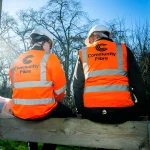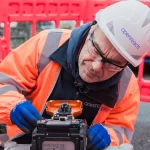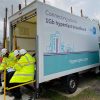North Skye Broadband Abandons FTTP Rollout Project Due to R100
The North Skye Broadband project, which had been hoping to secure state aid in order to help fund a pilot rollout of FTTP ultrafast broadband to hundreds of rural premises on the Isle of Skye (North side) in Scotland, has reluctantly abandoned its plan due to the R100 procurement process.
The Scottish Government recently committed £600 million of public investment (here and here) to make “superfast broadband” (30Mbps+) capable networks available to 100% of Scotland by the end of 2021 (March 2022 when viewing as a financial year); often referenced as the R100 programme.
At the end of last week the R100 strategy also resulted in the alternative support scheme for rural areas (Community Broadband Scotland) being stopped (here), which makes sense since had it continued then there would have been a heightened risk of duplicating the investment in certain areas.
Advertisement
The NSB project was one of those that aimed to harness over £1.2m of public investment via CBS. Unfortunately they abandoned this plan last year after complaining that their efforts had become “dogged by delays due to complex public procurement requirements” (here). At the suggestion of CBS, NSB instead decided to proceed with a pilot project to serve around 50 premises in the Glendale area of North Skye, funded by CBS with de minimis funding of €200,000.
Initially the new pilot faced “significant challenges“, including the lack of adequate back-haul from the Dunvegan BT exchange, and the costs of laying fibre from Dunvegan to the first premises served. Thankfully both of these were recently said to have been “successfully addressed“. An update on progress with the pilot was sent to CBS and Highlands and Islands Enterprise (HIE) on 16th January 2018 but the reply was not as expected.
CBS/HIE Response to NSB
“Scottish Government is committed to broadband infrastructure delivery through its R100 programme. As a result of state aid requirements, it is not possible to publicly fund any project outwith this programme. The procurement has started and companies are preparing tenders based on the intervention area. Until this procurement process is concluded and the potential extent of deployment from this initial procurement is confirmed, it is not possible to publicly fund any broadband infrastructure project.”
The response would appear to contradict what HIE said last week when they suggested that CBS’s existing projects would continue to be delivered and supported, although admittedly the language used was somewhat vague and may not have applied to projects in the same position as NSB. Nevertheless the result is that NSB now has insufficient funds to continue in any meaningful way.
NSB Statement to ISPreview.co.uk:
The CBS response gives no indication of any date when an application for de minimis funding to deliver the pilot project might be considered. Funding for planning and development of project work to deliver ultrafast FTTP broadband for North Skye was granted by HIE in late 2015 for 12 months but no further funding was made available, despite a request for this in early 2017. Consequently NSB now has insufficient funds to continue in any meaningful way.
As has been made clear by NSB, the R100 programme – being based on the National Broadband Scheme 2016 – is designed solely to provide public funds to subsidise private sector investment in telecommunications networks. It does not provide, and never has provided, funding for community-operated networks, where the business case for rural broadband is fragile, and the profit element required by private sector operators is sufficient to make that business case unviable. Hence, R100 is unlikely to deliver ultrafast broadband to anyone, aiming only to deliver superfast broadband using VDSL2 and, if requested, by offering vouchers for satellite connections.
At £3894 per premise, the R100 funding for the Highlands in Lot 1 of the ITT is on a par with NSB’s expected FTTP costs: in previous negotiations with CBS, NSB was told that a similar level of grant for its original project (~800 premises) was not viable. It is somewhat galling to see that amount now being offered as a substantial subsidy to privately owned “for profit” companies, when NSB – a community benefit society – is forbidden by the terms of the R100 procurement from even applying.
The CBS scheme was far from perfect and a number of community projects (not only NSB) found it both slow and difficult to harness, some of which is necessary because community schemes in rural areas tend to carry much bigger financial risks and thus political risks (example). This is particularly true for FTTP/H style deployments that tend to be significantly more expensive and carry the highest risk.
Advertisement
We have however seen a number of community FTTP/H schemes succeed elsewhere in the UK, although many of the most successful (e.g. B4RN) have done so by securing enough funding from local residents and businesses to begin their deployments, without initial recourse to state aid.
The onus is now on the Scottish Government to show that R100 can deliver something worthwhile for remote communities.
Mark is a professional technology writer, IT consultant and computer engineer from Dorset (England), he also founded ISPreview in 1999 and enjoys analysing the latest telecoms and broadband developments. Find me on X (Twitter), Mastodon, Facebook, BlueSky, Threads.net and Linkedin.
« Rural Landowners Seek 95% Geographic UK 4G Mobile Cover by 2022
Q4 2017 Map of Europe and UK Countries by Mobile Data Speed »

















































Comments are closed